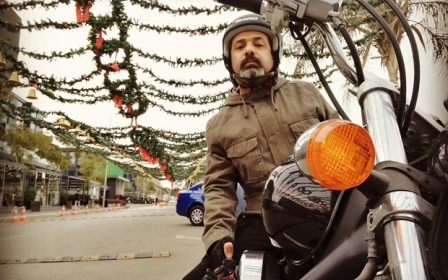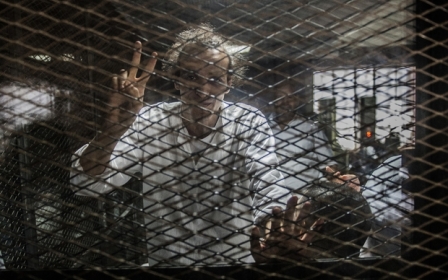Egyptian blogger Wael Abbas is free after seven months in custody

Egyptian blogger Wael Abbas has been freed from jail, his sister tweeted on Tuesday.
Last week, the Cairo criminal court upheld a ruling to release Abbas, as well as University of Washington doctoral student Walid el-Shobaky and filmmaker Momen Hassan, rejecting an earlier appeal by the state security prosecution in the capital against their release.
It remains unclear whether Shobaky and Hassan have been released.
The three men had been in detention since 23 May over charges of spreading false news and joining a "terrorist" organisation.
On 1 December, the Giza criminal court ordered their release on probation terms that included registering at a police station twice a week - but the decision was immediately appealed by the state security prosecution.
The court decision to uphold the release of the three defendants was welcomed by their families and supporters, who feel as though it has been a long time coming.
Abbas's sister, Rasha Abbas, said Wael was so overjoyed by the news that he could not eat during his family's most recent prison visit.
Abbas, 43, has been documenting torture and police brutality in Egypt through his blog and social media accounts since 2004, receiving many international awards for his work.
In 2017, Twitter suspended his 350,000-follower account without giving a specific reason. The company has since been accused of “hypocrisy” over its decision, notably since it has decided not to suspend the account of American conspiracy theorist Alex Jones.
Shobaky was arrested shortly after conducting an interview with Zagazig University law professor Mohammed Farahat in connection with his research into judicial independence in Egypt. He was held incommunicado for four days without access to a lawyer.
The US-based Scholars at Risk network said Shobaky’s arrest was “in apparent retaliation for nonviolent expression and academic activity”.
The specific reasons behind Momen Hassan's arrest and the charges levied against the filmmaker were not immediately clear.
Case 441 and enforced disappearance
Case 441 includes several other defendants who are still in custody, including human rights lawyer Ezzat Ghoneim, who has been held incommunicado since 13 September.
Human Rights Watch said Ghoneim had been “forcibly disappeared” by Egyptian police, despite a court order on 4 September to release him on probation.
The case also includes journalists Mostafa Al-Asar, Hassan al-Banan and Moataz Wadnan, according to Amnesty International.
In a separate case, award-winning Egyptian photojournalist Mahmoud Abu Zeid, widely known as Shawkan, was sentenced to five years in prison in September for taking photos at protests - a sentence amounting to time served. Nearly three months on, however, he has yet to be released.
Rights groups have documented at least 60,000 political prisoners in Egyptian jails since general-turned-president Abdel Fattah al-Sisi led a military coup against his democratically elected predecessor Mohamed Morsi in 2013.
Middle East Eye propose une couverture et une analyse indépendantes et incomparables du Moyen-Orient, de l’Afrique du Nord et d’autres régions du monde. Pour en savoir plus sur la reprise de ce contenu et les frais qui s’appliquent, veuillez remplir ce formulaire [en anglais]. Pour en savoir plus sur MEE, cliquez ici [en anglais].




